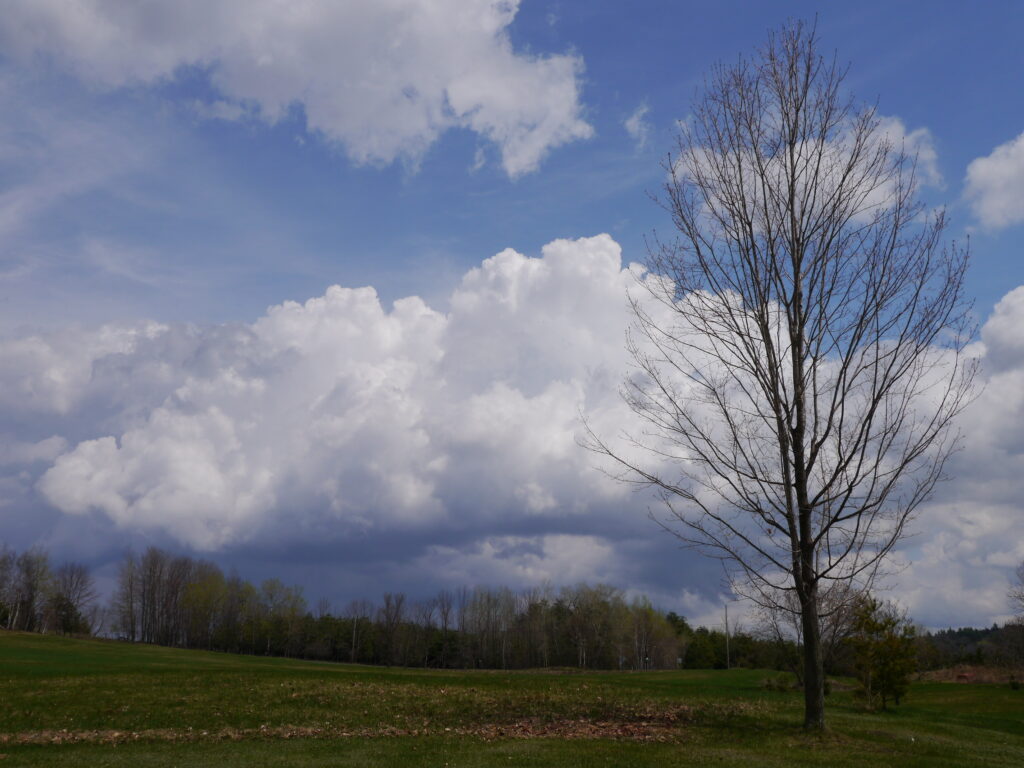
A friend recently discovered that her seven-times great-grandfather died when he was shot by someone who mistook him for a bear near Montreal in 1686. Needless to say, she was thrilled with that discovery. I can’t top that, but I did run across the bizarre deaths of brothers James Bagg and Jonathan Bagg in Suffield, Connecticut in 1766, and an even more unusual account of that event.
I found a reference online to “A short Account of Three Men that were killed by Lightning, at Suffield, Viz. Samuel Remington, James Bagg, Jonathan Bagg.” I expected it to be a newspaper article, but it is actually a long poem, published in 1767, that only briefly recounts the actual event. Most of the 41 four-line verses are a warning to the living to be ready for death. I suppose this is not surprising. Death often came unexpectedly to the colonists of New England, whether from an accident or disease.
The poem set up the scene:
‘Twas on the Twentieth Day of May;
These Men were in their Prime;
And by permission cruel Death
Did Snatch them out of time.
Two of the Men that Day rode forth
And left their Friends at Home,
And not thinking but to return
When they their Work had done,
But God’s Almighty Sovereign Hand
Did not intend it so;
He did intend their mortal Souls
Before his Bar should go.
It described the brothers:
Two of those Men had great
Prospects,Of Tables richly spread;
They may be round their Father’s Board,
Eating his heavenly bread.
These are two Men were scarcely found
In a vain Company,
From foolish Talking fun and light,
They did themselves deny,
They were not free from satan’s snares
while they were here below,
Eor he unguardedly steps in,
his snares are spread so low.
There was a comforting message:
One word to you that mourners are,
Cheer up and do not weep,
Hoping at the great judgement day
They’re found among Christ’s sheep.
The poem concluded with a stern reminder:
You that are not prepared now,
may read these lines with dread,
Who thinks the Lord will on us wait,
but likewise strike us dead.
And you that are prepar’d to go,
Will sing with great surprize,
While Sinners weep and rowl and roar
With weeping hearts and eyes.
Death always flies with wings unseen
to those that sleep secure,
And hungry death, with cruel graves,
both old and young devour.
There is a fuller account of the lightning strike that killed these men in an interview with a woman who searches for gravestone inscriptions that describe accidental deaths. Judi Trainor explained that brothers James and Jonathan Bagg, both in their late teens, were working in a field when they saw a storm approach. They ran to a nearby house and were sitting by the fireplace when they were struck. Today it is unusual for lightning to kill people indoors, but at that time, people did not understand the nature of lightning and the need to ground buildings.
James and Jonathan were born in West Springfield, Massachusetts, about 10 miles north of Suffield, Connecticut. According to West Springfield Births, they were the sons of James Bagg and his wife Bathsheba Dewey, who had been married in Springfield in 1744. James was baptized on March 15, 1746-7, Jonathan two years later.
James, Jonathan and their sister Bathsheba would have been distant cousins to my four-times great-grandfather Phineas Bagg, who was born in nearby Westfield, MA, around 1750. Their great-grandparents John Bagg and Hannah Burt, who married in Springfield in 1657, were their common ancestors.
The headstone inscriptions of James and Jonathan are online, however, there is a discrepancy: the inscriptions say the young men were the sons of Jonathan Bagg, rather than James. Both inscriptions read, “son of Jonathan, late of Springfield, & of Bathsheba, now wife of Captain Asaph Leavitt; died May 20, 1766.”
The mistake about the boys’ father probably appeared when the stone was engraved because James Bagg had died many years before, in 1749, aged 48, in West Springfield. His death would also explain why the couple had only three children. Mrs. Bathsheba Bagg married Capt. Leavitt in 1762.
Research notes: The account of the death of Claude Jodouin in 1686 can be found in the Bulletin des Recherches Historiques, Vol 41, p. 39, (otherwise known as the BRH), available at the library of La Société Généalogique canadienne-française (http://www.sgcf.com) in Montreal. You can read the full story at http://genealogyensemble.wordpress.com/2014/05/05/life-in-new-france-was-fraught-with-danger/
A short Account of Three Men that were killed by Lightning, at Suffield, Viz. Samuel Remington, James Bagg, Jonathan Bagg was printed and sold by Timothy Green, New London, 1767. It is not indicated whether Timothy Green also wrote it. A Google search brings up many references to this document, but some don’t actually link to an online copy. I found it on microfiche at the McGill University library, but an online copy described as A Loud Call to the Living is available through the Library of Congress website Memory of America, An American Time Capsule: Three Centuries of Broadsides and other printed Ephemera.
“A Sudden and Awful Manner”, an interview with Judi Trainor, written by Ben Shattuck, appeared in the online magazine The Morning News, Sept 11, 2013. http://www.themorningnews.org/article/a-sudden-and-awful-manner
Births, marriages and deaths in early Massachusetts are generally well documented. West Springfield records can be found in the database Massachusetts, Town and Vital Records, 1620-1988 on Ancestry.com, and in the members-only section of online databases of the New England Historic Genealogical Society (NEHGS), www.AmericanAncestors.org.
The headstone inscriptions of Suffield, Connecticut, 1660-1937 can be found at:
http://freepages.genealogy.rootsweb.ancestry.com/~kathycamp/Index/Page172.htm.
